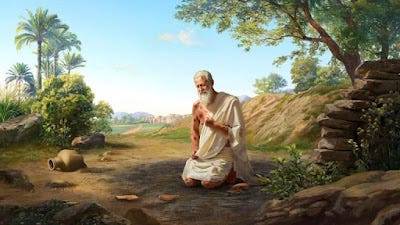God Knows Why; We Do Not
Then Job arose, and rent his robe, and shaved his head, and fell upon the ground, and worshiped. And he said, “Naked I came from my mother’s womb, and naked shall I return; the Lord gave, and the Lord has taken away; blessed be the name of the Lord.”
We are not in control. We never have been in control. We never will be in control.
We do not and will not control our lives, any more than we control whether the winds blow or the rains fall.
We did not control how or where we were born, and, beyond looking after our physical health, we will not control how or where we will die.
This is the reality of the world. This is the reality Job somehow managed to embrace. Ultimately, Job found his peace with the world in that reality.
Yet the mind rebels at this reality. Invariably, we seek to control all that is around us—politicians and business types seek to control people, marketers seek to control customers, parents strive mightily to control their children. Doctors and scientists expend great energy that we might exercise a measure of control over the things which make us sick.
We seek to control our world, we seek to understand our world, and we invariably fail to even come close. Nations of the world spent years and incalculable amounts of wealth striving to understand and control the SARS-CoV-2 virus, only to at last bow to the inevitable and learn instead to simply live with the virus.
We cannot control our world. It is, and will always be an exercise in futility. As the opening verses of Ecclesiastes remind us, "All is vanity!"
Yet even Job wanted to understand the world around him. He wanted to know why God had inflicted upon him so many sufferings. He was sure there was a reason behind it all, and he was determined to know that reason.
I will say to God, Do not condemn me; let me know why thou dost contend against me. Does it seem good to thee to oppress, to despise the work of thy hands and favor the designs of the wicked?
But Job was not to know, nor even to understand. That was the essence of God's response to Job.
“Who is this that darkens counsel by words without knowledge? Gird up your loins like a man, I will question you, and you shall declare to me. “Where were you when I laid the foundation of the earth? Tell me, if you have understanding. Who determined its measurements—surely you know! Or who stretched the line upon it? On what were its bases sunk, or who laid its cornerstone, when the morning stars sang together, and all the sons of God shouted for joy?
The reason for anything, God reminds Job, is simply that God has decreed it should be so.
God made the world, and therefore God controls the world. All that is good comes from God, as well as all that is evil. All knowledge comes from God. All wisdom comes from God. Whatever happens in this world happens is because God has willed it be so, and although we may not know why God so wills the world, we always know that God does will the world.
Our understanding of why God acts as He does is not required; God will act as He will regardless of what we do or do not understand.
We control only this much: we control what we say and we control what we do. We control the choices we ourselves make and that is all. Job's certainty before his friends of his own innocence before God came from his knowledge of what he had chosen in his life, what he had said and what he had done. Job accepted accountability for what he had said and done in his life, but he was not going to confess to saying or doing anything that he had not actually done, which his three friends kept urging him to do.
Ultimately, Job's righteousness and his three friends sinfulness arose from exactly this. Job could admit the boundaries of his knowledge. Although he knew and acknowledged all that he had said and done in his life, he did not know and could not fathom why God chose to afflict him. His friends, however, were so certain in their apprehension of God, so convinced that they knew the totality of God's mind, that they convinced themselves that Job must have some unrepented sin somewhere, for there could be (in their minds) no other reason why God would afflict anyone so.
In their presumptuousness and arrogance, Job's friends sought to impose a limitation upon God, that He could only act in accordance with their understanding. Yet it was Job who understood that the limitation is not upon God, but upon our understanding, both of Him and the world He created.
The world will unfold as it will, with or without our understanding, with or without our control. God knows the "why" and the "how" of the world's unfolding. We do not. We will not.


